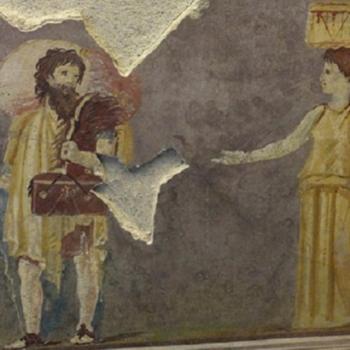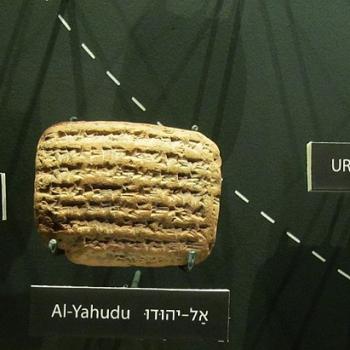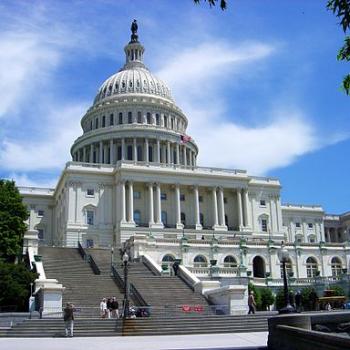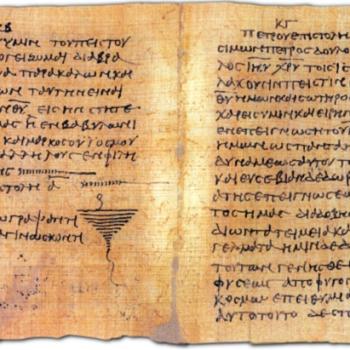The Pharisees have had a lot of undeserved bad press. Like the Puritans, they have unfairly become victims of a merciless historical spin machine. They have become everyone’s whipping boy. They are one of the most misunderstood groups I’ve ever known.
It’s hard for us to conceive that the Pharisees were actually the liberals of Jesus’ day. They were a group of laypeople who took the holiness laws designed for the priests, and tried to dumb them down to make them easier for the average person to obey. In the process, they got accused by other Jewish groups as being too permissive. The guys at Qumran accused the Pharisees of preaching “smooth things” (halaqot), a pun on the Pharisees’ word for code-of-conduct (halakot). Likewise, the same strictness that kept the Sadducees from believing in life after death because they couldn’t find it in the Torah, also led them to condemn the Pharisees for being too lax.

You want to know how liberal the Pharisees were? Part of their split with the Pharisees was because they were willing to give the high priesthood to someone who was not from the tribe of Levi (!), namely, Simon Maccabeus, the king from the tribe of Judah who was crowned by the Maccabees in 141 BCE (1 Maccabees 14:41). Who’s the liberal here? Also, while the Sadducees refused to believe in resurrection because they couldn’t find it in the Torah, the Pharisees believed in resurrection, angels, and evil spirits. When Jesus was able to prove resurrection from the Torah to the Sadducees, the Pharisees cheered for him. (Luke 20:27-40)
It might also surprise you to learn that when Judea was deep in civil war between these two parties, it was the Pharisees who invited the Romans to come in and stop the war.
The Pharisees took action on that old problem of unwritten rules that we find hidden everywhere in any society. The Pharisees identified those unwritten rules, collected them, and finally published them in writing. Hey, they had a great reason for doing so! By building what they called a “fence” around God’s law, they tried to make sure that no one came close to breaking that law. The Sadducees had a cow over what the Pharisees did: adding laws to the Law of Moses! The Pharisees claimed that God actually gave these rules to Moses when giving him the written Law.
But as Jesus said, the real problem was that they elevating those human-made rules above God’s word itself (Mark 7:9). The Pharisees were careful not to co-mingle their oral law with Scripture (Exodus Rabbah 47.1), which is why they never wrote it down until after 70 AD. But they regarded both oral law and Scripture as equally authoritative, and Sanhedrin 11:3 even declares, “Greater stringency applies to the words of the Scribes than to the words of the written Law.” Jesus loudly disagreed!
Jesus criticizes the Pharisees, not for being too strict, but for leaving themselves too many loopholes to evade the clear word of God. Jesus tells his audience to do what the Pharisees teach, but not what they practice (Matthew 23:2). They weasel out of oaths (Matthew 23:16-19). They weasel out of care for their parents (Mark 7:10-13). They meticulously tithe, but neglect justice, mercy, and faith (Matthew 23:23); Jesus responds that he wants to see both committed giving and committed living.
You think the Pharisees were prudes? Think again! The Pharisees proclaimed: “No man may abstain from the command, Be fruitful and multiply, unless he already has children” (Mishnah, Yebamoth 6:6). The Pharisees even specified how often a husband was obligated to have sex with his wife: every day if he was not employed, twice a week for laborers, once a week for donkey drivers, once a month for camel drivers, and once every six months for sailors (Mishnah, Ketuboth 5:6).
Yes, the Pharisees were elitists. But so were the Sadducees. And Qumran was even more elitist. Yet amazingly, in disputes between these parties (such as how to celebrate the Jewish holidays), the common people in Jesus’ day sided with…the Pharisees! Only John the Baptist and Jesus led movements that were open to all who were willing to come and follow.
Josephus says in his Antiquities 23:12-17 that the Pharisees are “extremely influential among the townsfolk, and all prayers and sacred rites of divine worship are performed according to their exposition,” and even the Sadducees “submit to the formulas of the Pharisees, since otherwise the masses would not tolerate them.” In Antiquities 13:298, he says, “The Sadducees have the confidence of the wealthy alone, but no following among the general populace.”
As an example, the Tosefta (Sukkah 3:1) tells of an incident where the Sadducees hid the willow branches to be used for the Feast of Tabernacles under a pile of stones to keep them from being used on the Sabbath. The common people found out and unburied the willows, because they sided with the Pharisees, who said that the beating of the willow branches takes precedence over the Sabbath.
Pharisees and Sadducees disagreed on how to apply the penalty against a false witness in a capital case (Mishnah, Makkoth 1:6). The Sadducees said the innocent person had to be executed first, while the Pharisees said the false witness can be executed on intention alone, even if he is caught before the original accused is executed.
The two groups argued about the wording of divorce documents. A Sadducee complained, “You Pharisees write the name of the secular ruler together with the name of Moses in a bill of divorce!” The Pharisees responded, “You Sadducees write the name of the secular ruler together with the name of God on the same page, and you put the ruler first, then God!” (Mishnah, Yadayim 4:8)
In another dispute, we read, “The Sadducees say, We cry out against you, O Pharisees, for you declare clean an unbroken stream of liquid! The Pharisees say, We cry out against you, O Sadducees, for you declare clean a stream of water that comes from a cemetery!” (Mishnah, Yadayim 4:7)
In many ways, Jesus was closer to the Pharisees than to any other Jewish group. There is no recorded memory of any role of the Pharisees in Jesus’ execution. We read in Acts 15 that there were Pharisees who were following Jesus, but not Sadducees or people from Qumran. The harsh words we hear from Jesus about them in Matthew 23 are not anti-Semitic; they are part of an in-house debate over who is the more faithful Torah-teacher. We often reserve our harshest criticism for those who are most like us.
So this Easter, or wherever we may find them as we preach the Gospel story, let’s quit trashing the Pharisees. They were not the moral monsters that common misperception has made them to be. Let us remember that when Jerusalem fell, it was not the Sadducees, or the commune at Qumran, but the Pharisees who survived to pass their brand of Judaism down to us.












